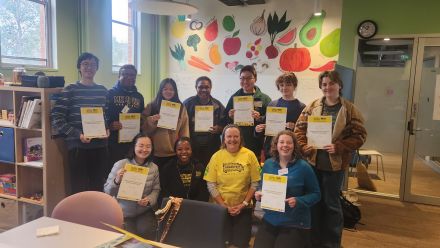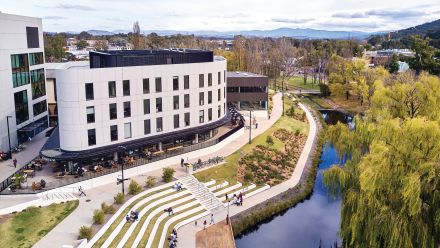What does the Sydney outbreak tell us?
There is no doubt that we are going through a very challenging and stressful time at present. I am sure many people thought we had this virus under control, and yet now it's starting to feel like it did back at the start of the pandemic in March last year.
And of course, things did seem to be getting better. A large number of effective and safe vaccines have been deployed and vaccination rollouts in many countries (if not our own) have been impressive. But we knew that it was going to take a Herculean effort to roll out vaccines to the world, and also that the longer it took to do so, the more chance there was that a more dangerous variant might emerge. And now it has.
The Delta variant has been a game changer
The Delta variant has arrived just in time for the southern winter months, and it caught Australia, as well as many other countries, unawares.
This variant is a true game changer. It's extremely high level of infectiousness has rendered ineffective NSW's so called "gold standard" approach to managing outbreaks and has driven increases in new cases of COVID-19 in many countries, even those who had seemed to turn the corner in recent months.
Daily cases are rising in the US, UK, most of Europe, South America, and large parts of South-East Asia. To put things into perspective, as bad as things seem in Sydney right now, the 7-day rolling average of new cases is 604 per million in the UK (54 per cent fully vaccinated and 14 per cent partially vaccinated), 155 in the US (48 per cent and 7.55 per cent, respectively), and only 5.71 in Australia (12.8 per cent and 17.6 per cent, respectively).
The Delta variant is also teaching us some serious lessons. In the words of New Zealand Prime Minister Jacinta Ardern, "the virus has changed and so must we". So what are the lessons that we have learned from the NSW outbreak and the smaller outbreaks it has seeded?
Lockdowns remain an important weapon, but they need to be quick and hard
I personally thought that lockdowns, which are after all a fairly blunt instrument, would be over by now but our glacial vaccine rollout, the rise of the Delta variant and the continued leakage of COVID-19 from our ineffective hotel quarantine system has meant that they remain the most effective weapon against the virus. As painful as lockdowns are, they are necessary and save lives. Recent evidence has showed that, from a health point of view, lockdowns have far less negative impact on health than COVID-19 does.
While we were always aware of last year's modelling that showed that every day a lockdown is delayed it adds a week to the end, the value of a timely and hard lockdown has become even more evident in recent weeks. The South Australia lockdown, called on day one of COVID-19 cases emerging, will end after a week. The Victorian lockdown, which began on day two is already getting towards two weeks and may be extended. Meanwhile, the softer NSW approach of a partial lockdown, which worked reasonably well at the beginning of the year, has resulted in a serious situation that will not be over until September at the earliest.
Lessons learned by the ACT
The ACT Government has been watching and learning from the mistakes of others. It has flagged its intent to take no chances - one local case will mean a short, sharp lockdown. This is why I am not concerned that what has happened in Sydney will happen in Canberra. Although it does feel like a local case may pop up at any time (and I've been expecting it for a month now), I think the ACT and ANU are well prepared.
My advice - expect the worst and then you won't be surprised, but also understand that the worst in Canberra should be a short, sharp lockdown.
Young people can become seriously ill, and even die, from COVID-19
On Sunday, we heard of the death of a young woman in her thirties who had no pre-existing conditions. While such a death is incredibly sad, it underlines what we have been saying all along - young people can also get COVID-19 and may become seriously ill.
Even Australian teenagers have ended up in ICU and people in their twenties account for the highest number of infections in the Sydney outbreak, followed by people in their thirties. There have even been around 400 cases in children under the age of 10.
Even if deaths are relatively rare, the UK experience also tells us that 10 per cent of people diagnosed with COVID-19, even relatively mild disease, will go on to suffer from "long COVID", and this includes young people.
In other words, COVID-19 is not a disease to be messed with, and the best way to manage it is to not get it in the first place. This is timely reminder of the importance of being COVID-safe, following public health directions and getting vaccinated as soon as you can, whatever your age.
Vaccines work really well
The evidence from Sydney is clear - being vaccinated for COVID-19 by either the Pfizer or AstraZeneca vaccine significantly reduces your risk of getting COVID-19, and dramatically reduces your risk of being hospitalised or dying from the disease. Anecdotally, no one who has had both doses of these vaccines has been admitted to ICU in NSW. A recently published UK study found there is little difference in terms of effectiveness between the two vaccines after two doses.
Getting the jab is the only way out of the pandemic
Until we vaccinate a significant amount of our population, we remain vulnerable - to lockdowns and disrupted plans, to a leaky quarantine system, to COVID-19 infection and to more deaths from the disease. And when will this be? Current predictions are that, with vaccine supply set to accelerate in the next month or so, we will reach our current target to vaccinate everyone aged 16 years and over, who wants to be vaccinated, by early next year.
Does this mean we will achieve herd immunity? Will we be able to open the borders, stop having lockdowns and "let it rip"? While we may have a two-tiered system by then, with different public health rules applying to those who have been vaccinated and those who have not, there will remain a large group unvaccinated but not by choice: children. The apparent increase in the numbers of infections in children seen with the Delta strain is a concern, and I can't see any of us being comfortable with letting COVID-19 run rampant knowing we are safe but our children are not.
Pfizer has recently been approved for children over 12, but the push will be on to ensure that it's safe to vaccinate even younger kids as quickly as we can. This will no doubt play a big role in determining how long it will be until life really returns to normal.
And vaccinating Australia is only part of the story. We know that the longer the virus continues to circulate, the more likely an even nastier variant will emerge. The race is definitely on, and hopefully we can soon move from our current inward national focus, to take a broader global view.
In conclusion, these are challenging times, we are all exhausted and COVID-19 is proving to be a formidable enemy. I remain confident that the Sydney outbreak will come under control in the next couple of months through a combination of even harder restrictions, increasing vaccination, and the warmer weather of Spring. But this will only be winning a battle not the war and there is much more to be done. The way ahead for each of us remains simple - be patient, be COVID-19 safe, and get vaccinated for yourself, for your community and for the greater global good.


